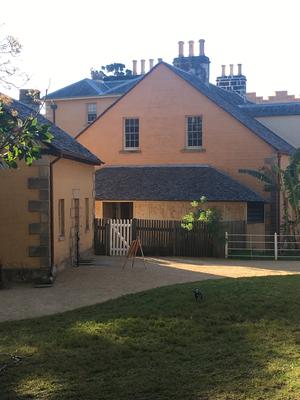As her final assignment in the Diploma of Family History at the University of Tasmania, Ros Escott chose to explore the life of Sarah Wentworth, who was the wife of renowned explorer and politician, William Wentworth, and a significant character of colonial history in her own right.
“I was really taken with the story of Sarah Wentworth, who was the illegitimate daughter of former convicts and became very well known as a social figure in mid-1800s Sydney,” Ros said.
“I visited Vaucluse House in Sydney and took some photos, and that’s what first inspired me to base my Photo Essay assignment on the story of Sarah and her experience living in Vaucluse House.”
Sarah Wentworth was routinely shunned by the press and the social elite of Sydney, who treated her as inferior because of her convict heritage and extra-marital children.
Ros’ photo essay explores the connections of Vaucluse House and the personal experiences of the Wentworth family through time – A formidable hedge of prickly pears still forms a barrier between the house and the outside world. The gate is open but there is little suggestion of welcome.

Vaucluse House, supplied by Ros Escott
In the 1850s, the Wentworths were ostracised so badly that they decided to move to England. Some years later they would return to Sydney, to find a more progressive and welcoming society – Sarah found New South Wales had become less exclusive and more tolerant. She emerged from social isolation and there were invitations to society functions and dinners.
Ros credits the Diploma of Family History for providing her with new skills to enhance her research abilities.
I’ve been interested in family history for many years. One thing I loved about the Diploma was the diversity of the units. There was a unit on writing skills, one on photography, one specifically on convicts – I enjoyed every unit that I did, and learning different approaches to the same topic.
“I’m retired but I do full-time volunteer work, so I don’t have a lot of spare time, and I studied the Diploma all online. There’s quite a lot of online contact with other students, so that suited me really well.”
For anyone interested in family history, Ros recommends the course as a practical means for exploring deeper historical insights.
“You never know what you don’t know until you try it, particularly things like referencing and writing skills, and the diversity of the units is a really great challenge,” Ros said.
“If you’re just starting out [researching history], you’ll learn a lot. If you think you already know a lot, you’ll still learn something new, because the course covers so many different levels.”


